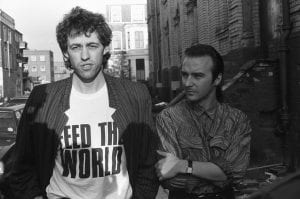The Fading Star Who Showed You Could Be Imperfect And Still Make A Positive Difference
You don’t have to be a saint to do something that has a profound effect on history, and the world around you. Sometimes you just have to be a regular person who gives a damn.
After all, consider the case of Bob Geldof.
Back in 1984, Geldof, a pop star on the shady side of his career, was eating dinner and watching TV. Flashing across the screen were images of people whose problems were far worse than a disintegrating band. On that night was a documentary about the venomous famines that had stricken Africa. Geldof was moved to do something about it.

At first, his plans were modest — merely to call friend and fellow Brit popper, Midge Ure, and write a song about the tragedy. Geldof would say later that at first the most he hoped for was for people to hear the song and have their awareness raised about the horror taking place. However, his plans expanded quickly, from telling people about what was going on to doing something about it.
Soon Geldof was begging, pleading and cajoling agents, managers and rock stars to appear on a benefit single to raise money for the starving people. He massaged egos, he promised meaty vocal bits, he acted as a diplomat between warring prima donnas. And it worked. The result of Geldof’s passion was “Do They Know It’s Christmas?” — a single that not only changed the rock and entertainment world, but saved the lives of countless people — within and without Africa.

Bob Geldof and Midge Ure pictured outside SARM Studios in Notting Hill, London, during the recording of the Band Aid single ‘Do They Know It’s Christmas?’, part of the Feed The World campaign, raising money for famine-stricken Ethiopia, on November 25, 1984. (Photo by Larry Ellis/Express Newspapers/Getty Images)
“Do They Know It’s Christmas?” has gone on to raise over $50 million for its cause. It recently charted again in Britain, as it has every year since it debuted in 1984, soaring to number 1. It spurred the recording of another song, “We Are The World,” that raised even more money for the cause. And it set the ball rolling for Live Aid, two concerts in Philadelphia and London that took place July 10, 1985. Seen by over one billion people worldwide, the Live Aid shows stand as the greatest fund-raising effort by rock stars; $54 million was raised to help feed the hungry in Ethiopia and Sudan.
But beyond that, the shows shot a surge of social consciousness throughout the rock and entertainment worlds one that has died down, but is still evident. The show spawned various spinoff concerts, including Farm Aid, which is still being performed to help America’s farmers, and other shows to raise funds for AIDS research, inner-city poor, and a number of other causes.
At the very least, the Live Aid shows made people think about things going on beyond their back yard, and made entertainers think about giving something back to people, rather than just taking.
Geldof has always been a hero of mine for what he did.
He took some shots for it; cynics labeled him “Saint Bob” and said that the whole thing was a self-righteous stunt. But I doubt it. Geldof’s dedication to his cause left no time for — and shattered — his band, the Boomtown Rats. And his solo career afterward was a bust. But even if the negative vibe merchants were right, and it was a stunt, it still saved millions of people. And it showed that one man could make a difference, even a rock scarecrow like Geldof.
Geldof was just a grubby singer who had some success in Europe and was then loosely part of a band on the skids. His biggest claim to fame on this side of the pond was that he starred as Pink in the mondo-depresso film, “The Wall.”
He wasn’t perfect. He was just a regular guy. A guy who saw something that wasn’t right and decided to do something about it.
“If nothing else, what this accomplished was to make compassion fashionable again,” Geldof said in 1985.
That was enough.









